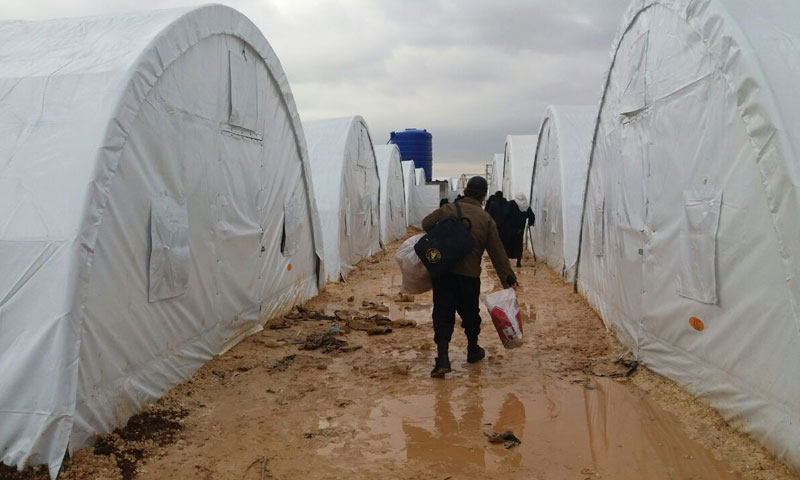
Iraqi Turkmen From Tel Afar Take Refuge in Northern Aleppo

Enab Baladi – Aleppo
Camps for the displaced in Syria are not exclusive to Syrians. Some of the camps along the border with Turkey now have hundreds of Iraqi residents who fled their homes due to the ongoing fighting between Islamic State fighters and the Iraqi Army and “Popular Mobilization” forces in the area surrounding Mosul.
Ekeda camp in Aleppo’s northern countryside close to the city of Azaz is one of the Iraqi camps on the Syrian-Turkish border. In recent months, it has witnessed an influx of Iraqi Turkmen from the area of Tel Afar in western Mosul seeking refuge in the camp.
Two thousand Iraqis in northern Aleppo
Speaking to Enab Baladi, Anas al-Omar, the camp’s deputy manager, explained, “The camp was inhabited by former residents of the northern and eastern countryside of Aleppo before the Islamic State took control of the area several months ago.”
When Islamic State forces gained control of the area they burned down the tents and most of the camp’s residents moved to settle close to Azaz city.
In the days after Islamic State forces left northern Aleppo, an NGO renovated the camp and covered the ground in gravel to make moving around easier. The camp became a place of refuge for Iraqis, especially with the latest migratory wave of people coming from the areas of Tel Afar, Mosul and Salah al-Din.
According to the deputy manager, the camp contains large tents that are divided into eight small rooms equipped with electricity and water. There is also a clinic to provide medical treatment. However, only 75% of the camp has been completed at this point in time.
Large numbers of Iraqi civilians have arrived at the camp, raising the number of inhabitants to 2400, most of whom are Iraqi Turkmen.
According to al-Omar, the camp receives assistance from the Turkish Diyanet Foundation, which provides all the necessary assistance and aid. The camp is administrated by the Nour al-Din al-Zenki Movement, which comes under the Free Syrian Army umbrella.
Free Syrian Army factions gained control of a large part of Aleppo’s northern countryside with the support of the Turkish army as part of the Euphrates Shield Operation after extensive battles with Islamic State forces, which are still ongoing.
Ankara is trying to make this area a “safe zone” after it reached an understanding with Russia and restored normal relations with the country. Russian warplanes have reduced their bombardment of the area since the start of the Euphrates Shield Operation in August 2016.
Chronic illnesses and no treatment
Salem, one of the Iraqi residents of the camp, spoke to Enab Baladi about conditions in the camp, which he described as “appalling”. He said, “There are no medicines or medical centers. Children are dying from diseases spreading in the camp and they are not being taken to hospital because the camp does not have an ambulance. The Turkish side of the border is closed and medical cases that require immediate treatment cannot cross.”
Several fires have broken out inside the camp without any attempts to put them out due to the lack of necessary materials. Salem added, “There are over 1000 elderly Iraqis registered in the camp and 800 of them are ill.”
Al-Omar clarified, “The Iraqis coming from Tel Afar have a high rate of disability and chronic diseases, much higher than normal. These cases require special treatment in advanced Turkish hospitals.”
While the deputy manager insists that the camp receives “a lot of support” from its primary donor, these illnesses continue to be one of the biggest problems residents face.
Exploitation by “human traffickers”
Salem, an Iraqi refugee Enab Baladi spoke to, could see no difference between the areas he passed through on his route from Iraq to Syria despite the different groups controlling the areas. They are all the same in terms of “exploitation”, according to him.
He explained, “We left Tel Afar out of fear of the Popular Mobilization Forces. We decided to leave until our area is liberated. We reached al-Raqqa and paid 700 US dollars each to get to the camp in northern Aleppo.” He confirmed, “Iraqis aren’t safe, whether from the Popular Mobilization, the Islamic State forces or the Free Syrian Army, they all stole our money.”
Anas al-Omar said that the residents coming to the camp from Iraq are exploited by those he described as “human traffickers” – smugglers who “suck refugees’ blood to get them to safety.”
According to one smuggler, the journey from al-Raqqa to Aleppo’s northern countryside can cost around 5,000 US dollars. In addition, residents risk being targeted by Islamic State forces and Syrian Democratic Forces when they pass through areas under their control.
At the end of our conversation with Salem, who lives in the camp with his family, he said that he was determined to cross into Turkey despite the increased border checks by the “Gendarmerie” (Turkish border guards). He said, “Life in the camp is unbearable. There is no education here, no medical care… We will enter Turkey even if it costs us our lives.”
if you think the article contain wrong information or you have additional details Send Correction
النسخة العربية من المقال
-
Follow us :
Most viewed
- Hidden aspects of Iranian consulate building targeted in Damascus
- Reduction of Fifth Corps: Pressure on Moscow reflected in Syria
- Syrian coast and Golan join the "Three Regions Document"
- Five injured in suicide drone attack by regime forces west of Aleppo
- US House of Representatives passes "Captagon II" bill

















 A
A
A
A
A
A



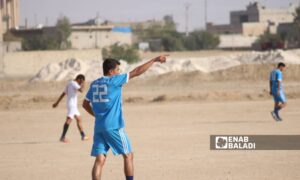
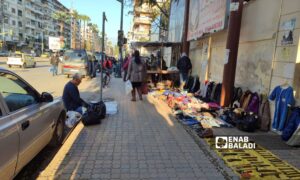
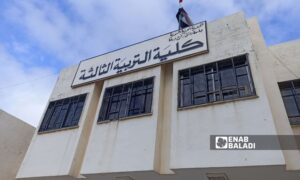

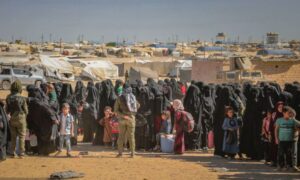
 More Society
More Society